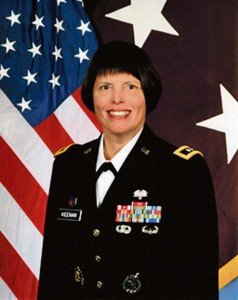Commanding general, Southern Regional Medical Command and Chief, U.S. Army Nurse Corps

Commanding general, Southern Regional Medical Command and Chief, U.S. Army Nurse Corps
The human brain is an extraordinarily complex organ. The brain is the seat of our personality; it’s what makes us uniquely ourselves.
Our minds are amazingly adaptable and resilient, and the Army has tapped into this trait to help Soldiers and families prepare for and adapt to whatever adversity they may face, either on deployment or in their daily lives.
Determined to decrease the stigma of seeking behavioral health treatment, the Army is in the process of a cultural change to encourage Soldiers and their families to come forward and get the help and the behavioral health care they need.
Former Army Sgt. Kyle J. White, who received a Medal of Honor May 13, has encouraged others to seek help.
“There’s no shame in going and getting help. These service members need to realize that they went to war and they made it back, but they might have some scars remaining,” White said. “Reach out to your chain of command, and they will help you to get the treatment that you need. If I can do it, then there’s no reason they can’t as well.”
White was diagnosed with post-traumatic stress disorder prior to his discharge from the Army, and is the first Medal of Honor recipient to publicly encourage Soldiers to come forward and end the silent suffering of so many who harbor emotional and mental scars.
He said that although there are treatment programs available, “ … it’s just those first steps – that service member who needs help coming forward and actually admitting, ‘Hey, I need to go see somebody,’ – that’s the issue that needs to be addressed, I believe.”
As the commanding general of the Southern Regional Medical Command and the market manager for the San Antonio Military Health System, my daily duties allow me the privilege to ensure the care and treatment of our nation’s sons and daughters.
I can’t emphasize enough the need to be open and encouraging to anyone, Soldier or family member who is struggling with a behavioral health diagnosis.
White’s insight into what it’s like to accept, treat and overcome PTSD gives me hope that it is an achievable goal for behavioral health patients to manage their illness.
However, it takes a village, so the Army is encouraging leaders, Soldiers, families, civilians and communities to start talking about it, engaging with each other, take personal responsibility, learn appropriate interventions, and build safe and supportive communities where help can be sought out and received by those who need it.
America’s sons and daughters are depending on everyday people like you and me to make healthy behavioral health conversations a normal part of daily life. Stand with me, San Antonio, and let’s TALK about it!
